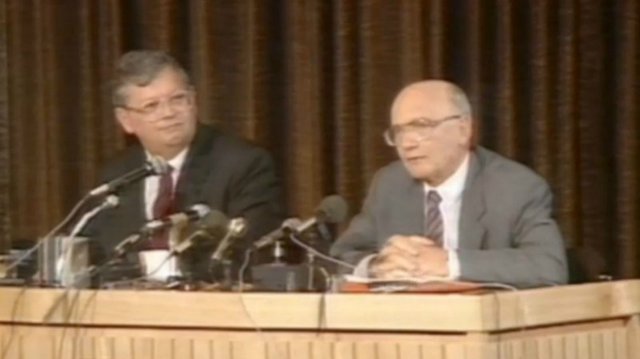The reforms that decentralised education administration in New Zealand schools.

David Lange and Brian Picot talking to media about the ‘Picot report’, May 1988 Screenshot: TVNZ
In the 1980s, the education system in New Zealand went through major legislative reform.
After taking power in 1984, the Fourth Labour Government under David Lange called for a review of the public school curriculum. The Department of Education produced the report A Review of the Core Curriculum for Schools 1984 and began public consultation. This culminated in the 1986 report The Curriculum Review.
In July 1987, the government set up a working group to review the bureaucracy surrounding New Zealand schools. Supermarket businessman Brian Picot was contracted to chair the group, with Maurice Gianotti, an administrator at the Department of Education, as CEO.Other members of the working group were Peter Ramsay, an associate professor and former teacher, Margaret Rosemergy, a senior lecturer at a teachers’ college, Whetu Wereta, a social researcher at the Department of Maori Affairs and Colin Wise, a textiles businessman. Simon Smelt from Treasury and Marijke Robinson from the State Services Commission were also attached to the group.
The Labour government was re-elected in August 1987 and Prime Minister David Lange appointed himself as the Minister of Education. The ‘Picot task force’ reviewed the administration of primary and secondary schooling in New Zealand and released the report Administering for Excellence: Effective Administration in Education in May 1988.
The report described the Department of Education as “inefficient and unresponsive” and recommended decentralising educational decisions by abolishing the Department of Education and the regional education boards and allowing schools to become independently governed by a local board made up of parents, the school principal and staff, while new government agencies monitor the schools, oversee student assessment and manage school property.
The Department of Education had continued work on a revised school curriculum and published the National Curriculum Statement: a Discussion Document for Primary and Secondary Schools (Draft) in 1988.
The government released a report based on the ‘Picot report’ in August 1988 called Tomorrow’s Schools: The Reform of Education Administration in New Zealand. The curriculum work had been effectively sidelined and did not proceed beyond the draft document.
The principal feature of the Tomorrow’s Schools reforms was that primary and secondary schools would become the basic “building block” of education administration.
A partnership between teaching professionals and the school community would be made through the introduction of a parent elected board of trustees and each school would write its own charter, setting out its own objectives, and be free to purchase services from a range of suppliers. A new Ministry would be established to advise the Minister, manage school property and handle financial flows, and a government auditing agency would regularly review each school and hold them accountable to their charters and government funding.
The Tomorrow’s Schools reforms were passed into New Zealand law in October 1989 as part of the Education Act 1989.
Primary and secondary schools became autonomous entities managed by a board of trustees that employed the school principal. School principals employed teaching staff, the Department of Education and regional education boards were abolished and the Ministry of Education, the Education Review Office, the New Zealand Qualifications Authority and the New Zealand Teachers Council were born.
To explore in more depth request the reports ‘Administering for Excellence: Effective Administration in Education’ and ‘Tomorrow’s Schools: The Reform of Education Administration in New Zealand’ from a New Zealand library.
✅ @thenewzeal, let me be the first to welcome you to Steemit! Congratulations on making your first post! I gave you a $.02 vote! Would you be so kind as to follow me back in return?
Downvoting a post can decrease pending rewards and make it less visible. Common reasons:
Submit